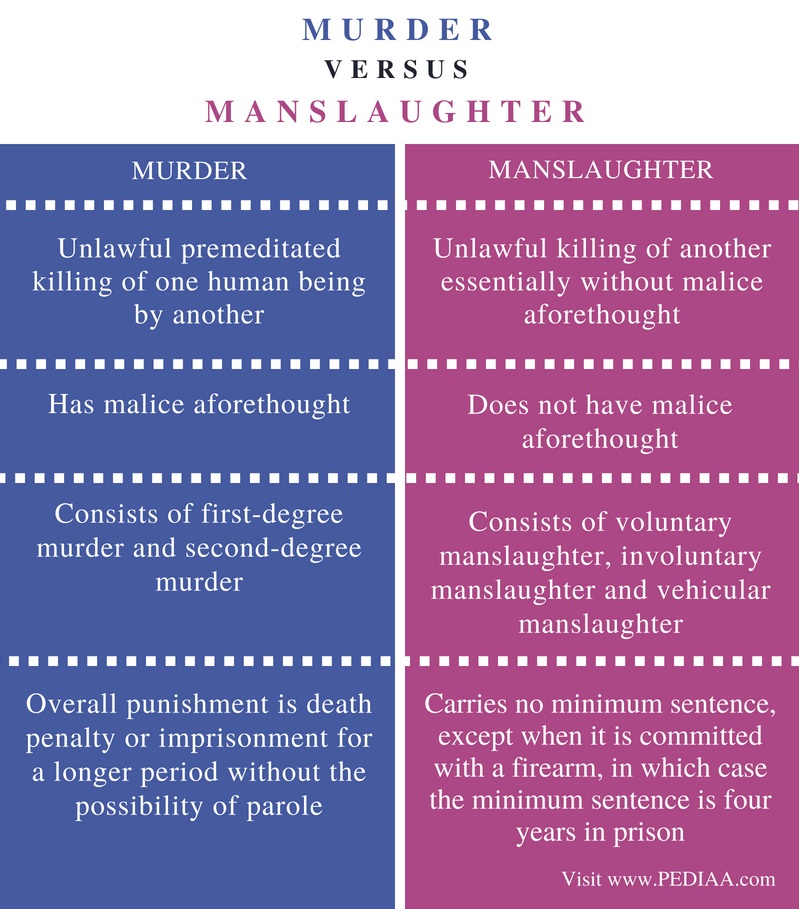*To kill someone means to terminate their life permanently. To kill someone means that they cease to exist in any meaningful biological or physiological sense of the term. To kill someone means to end their ability to do just about everything.
**To murder someone means to terminate their life permanently. To murder someone means that they cease to exist in any meaningful biological or physiological sense of the term. To murder someone means to end their ability to do just about everything.
***To commit homicide against someone means to terminate their life permanently. To commit homicide against someone means that they cease to exist in any meaningful biological or physiological sense of the term. To commit homicide against someone means to end their ability to do just about everything.
****To commit manslaughter against someone means to terminate their life permanently. To commit manslaughter against someone means that they cease to exist in any meaningful biological or physiological sense of the term. To commit manslaughter against someone means to end their ability to do just about everything.
Given these sets of sentences above, it is hard to argue that there is significant conceptual overlap between ‘killing’ and ‘murder.’ But despite their semantic equivalencies, at least for the abovementioned examples, are they one and the same? After careful analysis, it does not appear so…
To be clear, we have to be aware that our investigation of these terms involves a foray into the realm of law, both its theory and practice. Legal theories, terms, and processes are not always the same as those involved with moral analysis though. When we are trying to determine if something is right or wrong, good or bad (morally), we may not even ever end up discussing anything remotely related to the law. Put differently, what is legal is not always moral and what is moral is not always legal. What is illegal is sometimes moral and what is immoral is sometimes legal. But for this particular topic (or set of concepts), it is unavoidable.
For instance, slavery used to be legal, but it has always been immoral (even if it was legally allowed and socially admonished). Protesting in some countries is illegal, but in its purer forms, it is entirely moral and justified as a means of political participation/expression. We can draw numerous other examples from human history. Suffice it to say, legality and morality are NOT anywhere close to being identical concepts (much like killing and murder are not either).
Homicide is a broad term that references killing in both legal and illegal contexts. For instance, killing during a time of war may be referred to as homicide. The soldier responsible for killing his enemy on the battlefield may not necessarily have committed a crime (depending on the situation). Similarly, let’s say an intruder breaks into someone’s house late one night and threatens the family with a knife and a crowbar. The owner of the house is able to pull out his revolver and fire one well-placed shot into the lung of the intruder, incapacitating him immediately, thereby saving his family and protecting his property. The intruder, unfortunately, ends up dying pretty shortly after due to the effects of the gunshot wound to his lung. But because this was done in self-defense and in one’s own home, this would be considered homicide instead of murder.
Therefore, at least legally (but also morally), the main distinction between killing/homicide and murder is actually between murder and manslaughter. This makes sense when we think about the cause of death listed on autopsies: homicide. Homicide just means ‘killed.’ It is then up to the police and other investigators to determine if it was murder or manslaughter or merely an accident.
According to federal statutes as well as a variety of state statutes all across the US, murder involves (or is defined as) the illegal killing of someone that relies on malice aforethought to determine the severity and punishability of the crime. Malice aforethought merely means that the person understood moral right from wrong, moral good from bad, and that they still carried out their actions. It relates directly to culpability and responsibility.
In contrast, manslaughter comes in (2) varieties: voluntary and involuntary. Voluntary manslaughter occurs when a person kills another without any premeditation. An example of voluntary manslaughter is killing committed in the heat of passion. The intent was to kill another person or inflict bodily harm, however, the action was not premeditated. The provocation must be such that a reasonable person under the same circumstances would have acted the same way.
Involuntary manslaughter is when a person is killed by actions that involve a wanton disregard for life by another. Involuntary manslaughter is committed without premeditation and without the true intent to kill, but the death of another person still occurs as a result.
With all of this in mind, we have to be careful to use the right term(s) whenever we discuss the distinction between killing and murder. There is definitely overlap between the two concepts, but there are plenty of situations and contexts in which they are wildly different. In essence, sometimes killing is entirely justified and even morally praiseworthy. Sometimes murder is too. It all depends on the concrete details and the intentions of the agents involved.
Tagged: Ethics, Fatality, Homicide, Intention, Killing, Legality, Metaethics, Morality, Motive, murder


Leave a comment